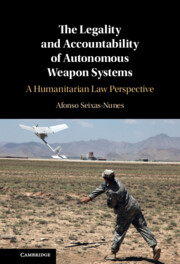Book contents
- The Legality and Accountability of Autonomous Weapon Systems
- The Legality and Accountability of Autonomous Weapon Systems
- Copyright page
- Dedication
- Contents
- Acknowledgements
- Abbreviations
- Introduction
- 1 Introducing Autonomous Systems of War
- 2 AWS
- 3 Autonomous Weapon Systems and ‘Autonomy’
- 4 AWS and the IHL Requirements
- 5 Accountability and Liability for the Deployment of Autonomous Weapon Systems
- Final Conclusion
- Index
5 - Accountability and Liability for the Deployment of Autonomous Weapon Systems
Published online by Cambridge University Press: 05 May 2022
- The Legality and Accountability of Autonomous Weapon Systems
- The Legality and Accountability of Autonomous Weapon Systems
- Copyright page
- Dedication
- Contents
- Acknowledgements
- Abbreviations
- Introduction
- 1 Introducing Autonomous Systems of War
- 2 AWS
- 3 Autonomous Weapon Systems and ‘Autonomy’
- 4 AWS and the IHL Requirements
- 5 Accountability and Liability for the Deployment of Autonomous Weapon Systems
- Final Conclusion
- Index
Summary
Chapter 5 analyses the questions of accountability, namely whether or not AWS will give place to an ‘accountability gap’. Its first part aims to explain that, from a legal point of view, what is relevant is who (human operators) or what (AWS) guarantees a better compliance with IHL. The second part looks at eventual violations of IHL caused by AWS. Three types of situations are distinguished: hardware malfunctions, accidents (violations caused by human fault) and errors (violations caused by the systems‘ software). In this regard, special attention is given to the category of ‘dolus eventualis’ for ‘accidents‘ as a level of guilt that should be included in the ICC Statute for some specific situations of individual accountability. In the case of ‘errors’- IHL violations caused by the software system alone - they cannot be attributed to any human operator but the deploying state alone. Lastly, in the third part, it is explained why machine learning algorithms introduce specific challenges in terms of evidence due to their black-box nature. In this regard, it is argued that those algorithms should be able to provide ‘factual algorithms’, that is, be able to provide information about the fundamental facts that the algorithm considered in its selection-making process.
Keywords
- Type
- Chapter
- Information
- The Legality and Accountability of Autonomous Weapon SystemsA Humanitarian Law Perspective, pp. 191 - 264Publisher: Cambridge University PressPrint publication year: 2022



